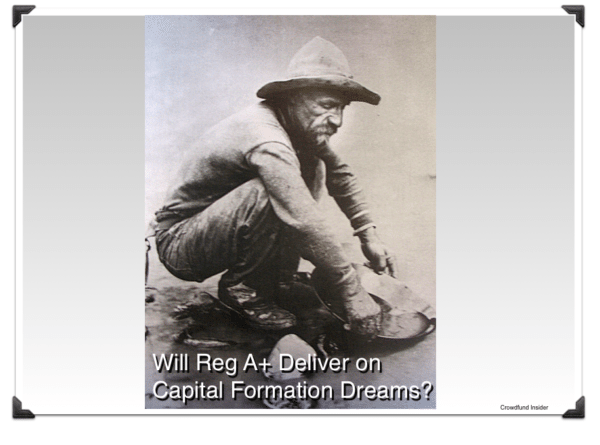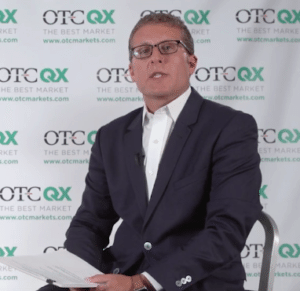
Regulation A, or Reg A+ as everyone now calls it, has been heralded as the future of small IPOs by some. The updated securities exemption was created by Title IV of the JOBS Act and came into effect during 2015. Allowing smaller companies to raise up to $50 million in a scaled disclosure environment was a missing step in the capital ladder. In the ensuing months since the updated exemption became actionable, billions of dollars have been filed under Form 1-A with the SEC. The numbers, as of the end of November 2016, are as follows:
- 165 offerings (including some that started as paper filers). 16 offerings have been withdrawn.
- Tier 1 – 80 offerings.
- Tier 2 – 85 offerings.
- At least 63 1-A offerings filed confidentially. Note: 30 of these 63 have moved forward with the public process as of 11/30/16.
- There have been 130 Qualifications through 11/30, representing 94 different companies. The average amount of time to receive qualification: 101 days.
- Of the 94 companies Qualified:
- Tier 1 – 38 offerings.
- Tier 2 – 56 offerings. Higher qualification rate among Tier 2 offerings.
- The average size of the offerings: Tier 1 – $9.5 million. Tier 2 – $28.9 million.
- Max raise sought in total: approximately $3 billion (a few have not indicated max raise amounts)
- Max raise sought by the companies that qualified: approximately $1.8 billion.
- Average total costs based on the disclosure in Part I information:
- Tier 1 – $120,000.
- Tier 2 – $920,000.
FACT SHEET: Regulation A+, Title IV of the JOBS Act
 One big proponent of Reg A+ is OTC Markets. Why is that? Issuers that use the exemption may choose to trade their shares soon after they have raised capital – hence the exemption sometimes being described as a mini-IPO.
One big proponent of Reg A+ is OTC Markets. Why is that? Issuers that use the exemption may choose to trade their shares soon after they have raised capital – hence the exemption sometimes being described as a mini-IPO.
The IPO market has been in decline for years now. The monolithic approach by policy makers to safeguarding markets and investors is to add rule upon regulation over and over again. Eventually, we will get to a point where no one does an IPO as the cost and complexity penetrate the stratosphere and we will all be saved. Right?
Wrong.
OTC Markets believes there is significant potential to re-invigorate the small IPO market and their marketplace is well positioned to take advantage of the new securities exemption. OTC Markets wants to be THE venture marketplace. The recent example of Elio Motors crowdfunding on StartEngine, and then quickly listing on the OTCQX, proved it could be done (with a few bumps along the way). There is also some data regarding IPOs that is helpful to OTC Markets position in the polemic.
According to a document presented to the Department of Treasury a couple years back a company considering a traditional IPO may expect a significant toll to go public; a cost that is inevitably born by the shareholders.
“Two recent surveys of pre- and post-IPO companies – one initiated by the IPO Task Force and one conducted by a company currently in registration by reviewing public filings of its peers – place the average cost of achieving initial regulatory compliance for an IPO at $2.5 million, followed by an ongoing compliance cost, once public, of $1.5 million(3) per year. These figures can represent a significant amount of an emerging company’s earnings before interest, taxes, depreciation and amortization (EBITDA) and can lower the company’s market cap based on EBITDA multiples by tens of millions of dollars. Respondents to the task force survey listed the regulatory burdens of going public as their primary concerns.”
Unless something changes in the regulatory approach, expect the cost of a traditional IPO to continue to go higher. At the same time, a Reg A+ issuer can generate liquidity by listing on OTC Markets for considerable less.
Recently at the Crowd Invest Summit in Los Angeles, Crowdfund Insider caught up with Jason Paltrowitz, Executive Vice President of OTC Markets. Paltrowitz clearly has a stake in the future of Reg A+ but, in his opinion, the update securities exemption is a game changer.
Our discussion regarding Reg A+ is shared below.
 Crowdfund Insider: How optimistic are you regarding the evolving Reg A+ market for both issuers and OTC Markets?
Crowdfund Insider: How optimistic are you regarding the evolving Reg A+ market for both issuers and OTC Markets?
Jason L. Paltrowitz: Very for both. Certainly allowing companies to raise money directly from their customers, online, and have those shares be immediately tradable is a game changer. The IPO market was broken for many small companies, and the game was rigged – rich people and their friends had access to new issues of securities, and they were mainly in it for the quick buck. Reg A+ affords companies the opportunity to raise money from the very people that are stakeholders, believers and customers of the company – they are not in it just to flip the stock. It will take some time for this to catch on, but like all things related to the internet, it will not go away. As for OTC markets, we see ourselves as the natural venue for the trading of these shares. There are a lot of people trying to sell companies on the dream of exchange listing, but the truth is, exchanges are not the right venue for the types of companies using Reg A for the following reasons:
- Cost – as per the above the average cost to be public on an exchange is $2.5M in year 1 and $1.5 ongoing. If you are raising up to $50 million that is a lot. A lot of that cost is to meet the corporate governance and reporting standards that the exchanges have created to mitigate risk for S&P 500 index investors – these things (compensation committee as an example) aren’t necessary for Reg A issuers. The system puts in place all of these rules and requirements that force you into having to hire expensive experts to navigate – none of those people saw Enron coming – largely wasted money for a small cap
- Time – any CEO on a national exchange might as well block off 1/3 of their time to deal with all the requirements of exchange listing – see above
- Tradability – reality is that companies trading less than 50,000 shares a day are not served by the limit order matching engine technology used by exchanges. There have been any number of studies showing that dealer markets are best for small companies with less volume.
- Investors – 85% of investors in companies sub $500 market cap are self-directed, not institutions. Dealer markets are much better suited to meet their needs.
 Crowdfund Insider: What kind of deal flow do you see for issuers considering an OTC listing following a Reg A+ offer? What type of companies?
Crowdfund Insider: What kind of deal flow do you see for issuers considering an OTC listing following a Reg A+ offer? What type of companies?
Jason Paltrowitz: Elio was the first – obviously. There are a number issuers in the pipeline in various phases. Mostly consumer and technology companies with some REITs as well.
Crowdfund Insider: Some of the growing pains you recently mentioned were the “experts” attempting to advise Reg A+ issuers. Can you elaborate?
Jason Paltrowitz: There are some providers that are trying to fit Reg A into their old capital raise model – for that they can extract significant fees. Small companies don’t know better – they hear NASDAQ or are promised the max raise, large institutional investors and are easily swayed. We try to make sure issuers are educated. Also, as it stands now, once you go to an exchange you can no longer avail yourself of Reg A – many issuers don’t realize that. We also see advisers that work on a deal and quickly try to push a follow-on offering and advising on a second raise – in many cases a toxic PIPE or some other death spiral financing. Reg A was designed to help early stage companies raise money in a way that is more cost-effective and easier than traditional IPO – issuers should remember that and act accordingly. Using Reg A just like a typical IPO is money and time wasted and not fit for that purpose.
Crowdfund Insider: How can an issuer dodge these less scrupulous advisors (IE some attorneys/accountants)?
Jason Paltrowitz: Hundreds of providers call themselves Reg A experts– but look at the deals they have done (if any). What did they charge? How much did they raise? What are your obligations to them after the raise? There are many neutral parties – like us – that are happy to help navigate and answer questions. It’s always smart to get a second or third opinion.
 Crowdfund Insider: Is this a game changer?
Crowdfund Insider: Is this a game changer?
Jason Paltrowitz: Yes. But not today – it will be a slow burn and it will not be for everyone. But in terms of small companies raising capital and creating a new security that can be held by average investors, absolutely yes.

